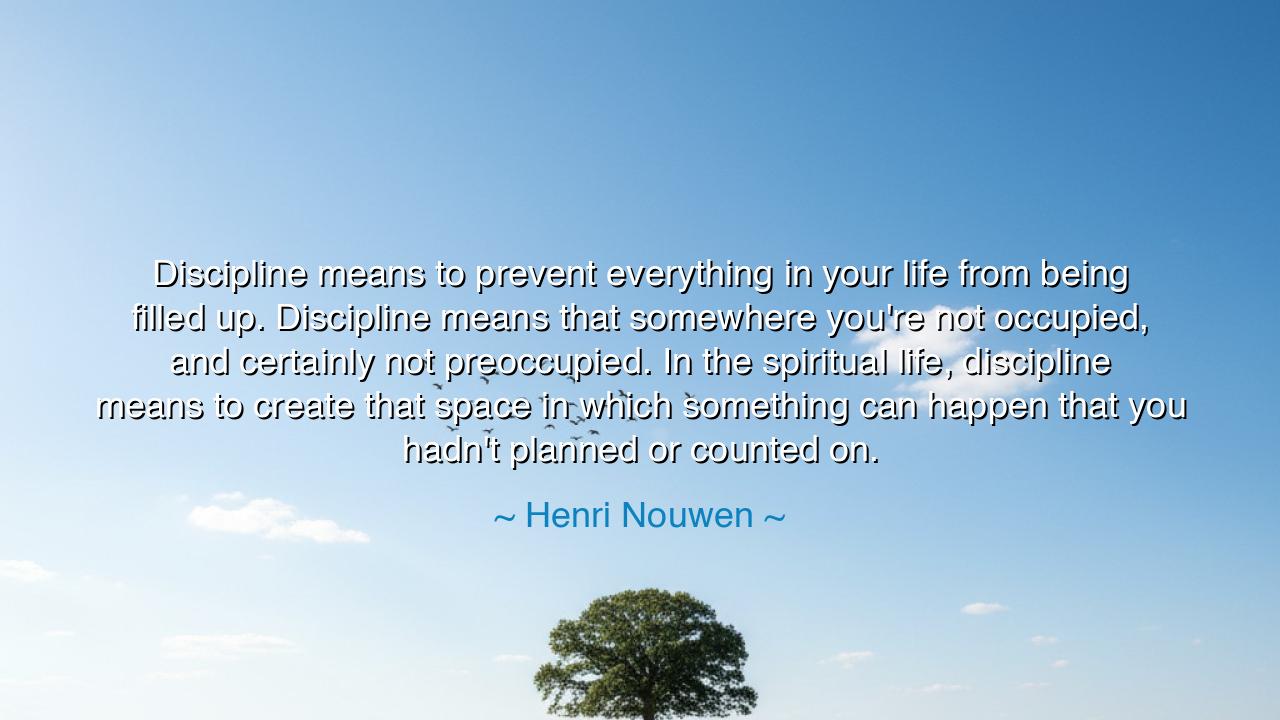
Discipline means to prevent everything in your life from being
Discipline means to prevent everything in your life from being filled up. Discipline means that somewhere you're not occupied, and certainly not preoccupied. In the spiritual life, discipline means to create that space in which something can happen that you hadn't planned or counted on.






Hear the gentle yet piercing words of Henri Nouwen, shepherd of souls and pilgrim of silence: “Discipline means to prevent everything in your life from being filled up. Discipline means that somewhere you’re not occupied, and certainly not preoccupied. In the spiritual life, discipline means to create that space in which something can happen that you hadn’t planned or counted on.” These words are a lantern for the weary traveler, reminding us that true discipline is not the endless filling of hours, but the courageous guarding of emptiness, where the unexpected gift of grace may enter.
The meaning is profound. In the world, we are taught that discipline means relentless productivity, a life without gaps, a calendar with no blank spaces. Yet Nouwen reverses this notion. He teaches that discipline is not about cramming every hour with tasks, but about refusing to let every corner of life be occupied. It is about cultivating space—not laziness, but sacred openness. For when we are not preoccupied, when we allow silence and stillness, we create the possibility for mystery, for divine encounter, for a blessing we could never have manufactured by our own hands.
The origin of these words rests in Nouwen’s own journey. A priest, professor, and writer, he left the heights of academia to live among the mentally handicapped at L’Arche community, where he discovered that the most profound lessons came not through ceaseless effort, but through presence, waiting, and openness to the unplanned. He saw that in spiritual life, control often blinds us, while emptiness makes room for revelation. Thus his definition of discipline was born: not endless striving, but guarding the soul’s stillness so that the Eternal might break in.
History gives us examples that echo this truth. Think of Moses, who did not hear the voice of God while busying himself with Pharaoh’s court, but while tending sheep in the quiet wilderness. It was in the open, unoccupied space of the desert that the burning bush blazed before him. Or consider Buddha, who left behind his princely distractions and sat beneath the Bodhi tree, empty of ambition, until enlightenment dawned. In both stories, we see what Nouwen proclaims: when life is not filled to the brim, when we create stillness, something beyond imagination enters.
The danger lies in forgetting this wisdom. Many today live entirely preoccupied—their minds cluttered, their hearts restless, their days without stillness. They mistake busyness for meaning, yet find themselves hollow, exhausted, unable to hear the whisper of the Spirit. To such souls, Nouwen’s words cry out like a prophet’s call: guard a portion of your life as empty, not wasted but consecrated. Without such discipline, no space remains for wonder, for love, for the sacred interruption that can transform a life.
The lesson for us is clear: if we would grow, if we would hear, if we would live deeply, we must cultivate emptiness. This is not abandonment of duty, but recognition that life’s greatest treasures come unplanned. A conversation that heals, a moment of beauty that lifts the heart, a quiet stirring of the soul—all these need space in which to unfold. Without discipline, we trample these gifts beneath the noise of constant activity.
Practical action flows from this teaching. Guard moments of silence each day. Set aside the screen, the endless task, the mind’s chatter. Create a small space—in your morning, in your evening—where you are not occupied. Walk alone beneath the sky, sit quietly with your breath, leave margin in your schedule. Do not fear the emptiness, for it is the cradle of the unexpected. Trust that in the stillness, something greater than yourself may enter.
Take this as a guiding flame: true discipline is not the conquest of time, but the consecration of space. To live with such discipline is to walk with open hands, ready to receive what you did not plan, what you could not earn, but what may transform you forever. In this way, you will learn that the most profound moments of existence are not made by you, but given to you, when you dare to leave room for the Eternal.






AAdministratorAdministrator
Welcome, honored guests. Please leave a comment, we will respond soon